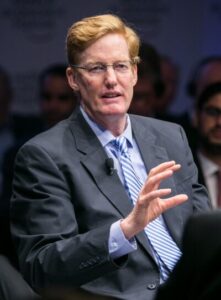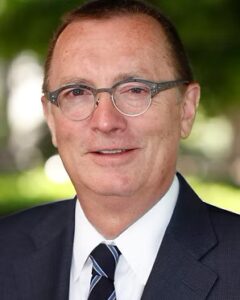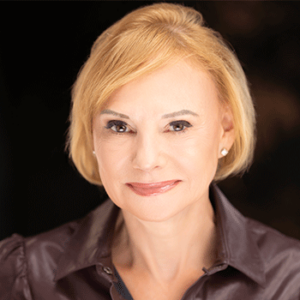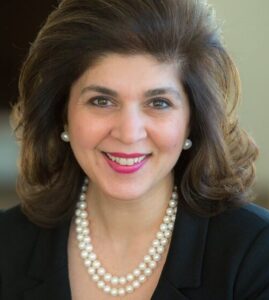Upcoming Speakers
Joshua Landis
May 12, 2025
Topic: Syria and the Middle East
 Joshua Landis is Sandra Mackey Chair and Director of the Center for Middle East Studies in the Boren College of International Studies at the University of Oklahoma.
Joshua Landis is Sandra Mackey Chair and Director of the Center for Middle East Studies in the Boren College of International Studies at the University of Oklahoma.
He publishes frequently in policy journals such as Foreign Affairs, Middle East Policy and Foreign Policy. His book: Syria at Independence, Nationalism, Leadership, and Failure of Republicanism will be published by the Arab Center for research and Policy studies this coming year, and he writes and manages “SyriaComment.com,” a newsletter on Syrian politics. He has written many scholarly articles and is a frequent analyst on TV, radio, and in print and has appeared many times on the Australian Broadcasting Corp. He is a non-resident fellow at the Quincy Institute in Washington DC.
He has received three Fulbright Grants to support his research in Syria and won numerous prizes for his teaching. He is past President of the Syrian Studies Association and has consulted with many branches of the U.S. government.
He has lived over 15 years in the Middle East and 4 in Syria. He spent most summers in Syria before the uprising on 2011.
He was educated at Swarthmore (BA), Harvard (MA), and Princeton (PhD).
He is married to Manar Kashour and has two sons, Jonah and Kendall.
Ambassador Jeffrey Feltman
June 2, 2025
Topic: United Nations
 Jeffrey D. Feltman is the John C. Whitehead Visiting Fellow in International Diplomacy in the Foreign Policy program at the Brookings Institute. Prior to this position, Feltman served as the United Nations Under-Secretary-General for Political Affairs. As head of the United Nations Department of Political Affairs Feltman oversees the UN’s diplomatic efforts to prevent and mitigate conflict around the globe.
Jeffrey D. Feltman is the John C. Whitehead Visiting Fellow in International Diplomacy in the Foreign Policy program at the Brookings Institute. Prior to this position, Feltman served as the United Nations Under-Secretary-General for Political Affairs. As head of the United Nations Department of Political Affairs Feltman oversees the UN’s diplomatic efforts to prevent and mitigate conflict around the globe.
Before joining the United Nations, Feltman served as US Assistant Secretary of State for Near Eastern Affairs from August 2009 to June 2012 with the rank of Career Minister. He was previously the United States Ambassador to Lebanon from July 2004 to January 2008.
Before becoming Ambassador to Lebanon, Feltman volunteered to serve at the Coalition Provisional Authority office in Irbil, Iraq, from January to April 2004. Prior to his work in Iraq, he was at the U.S. Consulate General in Jerusalem, where he served first as Deputy (August 2001-November 2002) and then as Acting Principal Officer (November 2002 to December 2003).
He joined the U.S. Foreign Service in 1986, serving his first tour as consular officer in Port-au-Prince, Haiti. He has spent much of his career dealing with Eastern Europe and the Near East. He served in Embassy Tel Aviv as Ambassador Martin Indyk’s Special Assistant on Peace Process issues (2000-2001). Before that, from 1998-2000, Feltman served as Chief of the Political and Economic Section at the U.S. Embassy in Tunisia. He served in the U.S. Embassy in Tel Aviv from 1995 to 1998, covering economic issues in the Gaza Strip.
Feltman studied Arabic at the University of Jordan in Amman from 1994 to 1995. From 1991 to 1993, Feltman served in the office of the Deputy Secretary of State, Lawrence Eagleburger, as a Special Assistant concentrating on the coordination of U.S. assistance to Eastern and Central Europe. He served as an economic officer at the U.S. Embassy in Hungary from 1988 to 1991.
Feltman was born in Greenville, Ohio in 1959. He speaks Arabic, French and Hungarian. He received his undergraduate degree in history and fine arts from Ball State University in Indiana in 1981 and his Master’s degree in Law and Diplomacy from the Fletcher School of Law and Diplomacy at Tufts University in 1983.
His lengthy reporting cables are widely read in Washington, enjoyed by senior policy officials and analysts for their narrative qualities and insight. Middle East expert Joshua Landis reported in March 2007 that “Feltman has a most unusual arrangement with Secretary Rice; he has a weekly video conference with the Secretary – access of the like only the Ambassador to Iraq can boast.”
Kenneth Frankel
June 23, 2025
Topic: Latin America in the New Geopolitical Environment
 Kenneth Frankel has been president of the Canadian Council for the Americas (CCA) since 2014 and was previously Chairman from 2007 to 2014. He was awarded The Queen Elizabeth II Diamond Jubilee Medal by the Governor General of Canada in 2013 for his work on behalf of the CCA and for leadership on other hemispheric public policy initiatives.
Kenneth Frankel has been president of the Canadian Council for the Americas (CCA) since 2014 and was previously Chairman from 2007 to 2014. He was awarded The Queen Elizabeth II Diamond Jubilee Medal by the Governor General of Canada in 2013 for his work on behalf of the CCA and for leadership on other hemispheric public policy initiatives.
Frankel is also a Board Director of Global Americans, a think tank based in Washington D.C., and has been a Visiting Professor of Law at Ghent University (Belgium) since 2014 where he teaches international commercial negotiation. He is also an Adjunct at University of Bologna and has held Adjunct/Visiting Professorships at American University (Washington, D.C.), Western University (Canada), University of Pretoria (South Africa) and University College Cork (Ireland).
Frankel was the Legal Advisor to the Secretary General at the Organization of American States from 2008-2013. He was co-host of the podcast, “Two Gringos with Questions”, with Chris Sabatini (Chatham House / London) and a frequent commentator in media in Canada and elsewhere in the hemisphere. He was Chair of the Latin American Practice Group at Torys and held General Counsel and/or International Council positions for Alcatel in Canada, Spain, Poland and Germany.
Frankel started his career as a Law Clerk to U.S. Federal District Court Judge Eugene P. Spellman in Miami during the “Miami Vice” era. Previously, he was a research associate with Professor John Womack, Jr. (Harvard University) as a Reynolds Fellow in Mexico, and a political writer in Mexico and Central America as a Dartmouth College Public Affairs Fellow.
Frankel holds a A.B. cum laude, High Distinction from Dartmouth College in Latin American Studies and a J.D. from Northeastern University.
Sherri Goodman
July 15, 2025
Topic: Arctic Security in a Changing Environment
 Sherri Goodman, Senior Fellow at the Wilson Center’s Environmental Change and Security Program and Polar Institute, and Secretary General of the International Military Council on Climate & Security, is credited with educating a generation of US military and government officials about the nexus between energy, climate change and national security, using her famous coinage, “threat multiplier,” to fundamentally reshape the national discourse on the topic. A former first Deputy Undersecretary of Defense (Environmental Security) and staff member on the Senate Armed Services Committee, Goodman has founded, led, or advised nearly a dozen research organizations on environmental and energy matters, national security, and public policy. Her new book, Threat Multiplier: Climate Change, the Military and Fight for Global Security was published in 2024.
Sherri Goodman, Senior Fellow at the Wilson Center’s Environmental Change and Security Program and Polar Institute, and Secretary General of the International Military Council on Climate & Security, is credited with educating a generation of US military and government officials about the nexus between energy, climate change and national security, using her famous coinage, “threat multiplier,” to fundamentally reshape the national discourse on the topic. A former first Deputy Undersecretary of Defense (Environmental Security) and staff member on the Senate Armed Services Committee, Goodman has founded, led, or advised nearly a dozen research organizations on environmental and energy matters, national security, and public policy. Her new book, Threat Multiplier: Climate Change, the Military and Fight for Global Security was published in 2024.
A summa cum laude graduate of Amherst College, she earned a law degree from Harvard Law School and a masters in public policy from the Harvard Kennedy School of Government. She received an Honorary Doctorate in Humane Letters from Amherst College in 2018. She received a Lifetime Achievement Award from the Environmental Peacebuilding Association in the Hague in 2024.
Farah Pandith
August 11, 2025
Topic: How We Win: The Threat from Hate and the Power of Compassion
 Farah Pandith is a foreign policy strategist and former diplomat. A world-leading expert and pioneer in countering violent extremism, she is the author of the book How We Win: How Cutting-Edge Entrepreneurs, Political Visionaries, Enlightened Business Leaders, and Social Media Mavens Can Defeat the Extremist Threat. She is a frequent media commentator and public speaker, and has written for publications including The Economist, The Washington Post and The New York Times.
Farah Pandith is a foreign policy strategist and former diplomat. A world-leading expert and pioneer in countering violent extremism, she is the author of the book How We Win: How Cutting-Edge Entrepreneurs, Political Visionaries, Enlightened Business Leaders, and Social Media Mavens Can Defeat the Extremist Threat. She is a frequent media commentator and public speaker, and has written for publications including The Economist, The Washington Post and The New York Times.
Farah served as a political appointee under three presidents – most recently as the first-ever Special Representative to Muslim Communities, serving both Secretary Clinton and Kerry. She has served on the National Security Council, at the U.S. Department of State, and at the U.S. Agency for International Development in various senior roles. She was appointed to the Department of Homeland Security’s Advisory Council, chairing its countering violent extremism task force.
She is currently a senior fellow at the Council on Foreign Relations and an adjunct professor at Georgetown University. She serves on leadership or advisory boards of organizations including We Are Family Foundation, America Abroad Media, The Asian American Foundation, USC Center on Public Diplomacy, and the Institute for Strategic Dialogue. Over the last decade she has been a senior fellow at the Belfer Center for Science and International Affairs at the Harvard Kennedy School, a senior advisor with the Anti-Defamation League and a senior advisor at the Milken Center for Advancing the American Dream. In 2020, the Muhammad Ali Center named Farah the first-ever Muhammad Ali Global Peace Laureate for her proven track record of and commitment to promoting humanitarian values; she is the creator and catalyst for the Muhammad Ali Index on Compassion.
Farah received an A.B. from Smith College and a Master of Arts in Law and Diplomacy from the Fletcher School of Law and Diplomacy. Farah was born in India and raised in the Commonwealth of Massachusetts.